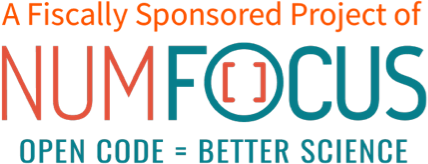What exactly do you mean by 'journal'
The Proceedings of the JuliaCon Conferences (JCON) is an academic journal (ISSN 2642-4029) with a formal peer review process that is designed to improve the quality of the software submitted. Upon acceptance into JCON, a Crossref DOI is minted and we list your paper on the JCON website.
Don't we have enough journals already?
Perhaps, and in a perfect world we'd rather papers about software weren't necessary but we recognize that for most researchers, papers and not software are the currency of academic research and that citations are required for a good career.
We built this journal because we believe that after you've done the hard work of writing great software, it shouldn't take weeks and months to write a paper about your work.
You said developer friendly, what do you mean?
We have a simple submission workflow and an accessible author's guide to help you prepare your submission. As further guidance, there is the extensive JOSS documentation. If your software is already well documented then paper preparation should take no more than an hour.
I want to support you as a reviewer. Where do I apply?
Submissions
Not all papers are eligible to be published in the JuliaCon proceedings. Submissions must be related to JuliaCon contributions such as talks, posters, or similar. Generally, this journal will accept two different kinds of submissions:
- a short form extended abstract (similar to a standard JOSS paper) of about one page excluding references,
- a more in-depth long form paper of about 5-10 pages.
Authors wishing to make a pre-submission enquiry should open an issue on the JCON repository.
Editorial Board

Mathieu Besançon (@matbesancon)
Tenured Research Scientist at INRIA Grenoble - Mathematical Optimization

Topic Editors

Oscar Dowson (@odow)

Editors Emeritus
Ranjan Anantharaman, Carsten Bauer, Valentin Churavy
Contact JCON
To suggest a feature, report a bug, or enquire about a possible submission in JCON, please open a GitHub Issue. If you need to contact JCON privately then you can email us.
Code of Conduct
Although spaces may feel informal at times, we want to remind authors and reviewers (and anyone else) that this is a professional space. As such, the JCON community adheres to the Julia Community Standards.
Authors and reviewers will be required to confirm they have read our code of conduct, and are expected to adhere to it in all JCON spaces and associated interactions.
Ethics Guidelines
We also want to remind authors and reviewers (and anyone else) that we expect and require ethical behavior. Some examples are:
- All authors are obliged to provide retractions or corrections of any mistakes of which they become aware.
- Plagiarism (e.g., violation of another author's copyright), for both software and papers, is not allowed.
- Self-plagiarism (repeated publication of the same work) is not allowed.
- Author lists must be correct and complete. All listed authors must have made a contribution to the work, and all significant contributors should be included in the author list.
- Reviews should be accurate and non-fraudulent. Examples of concerns are: Authors should not suggest reviewers who are not real people or have conflicts (see conflict of interest policy for details). Reviewers and editors must disclose conflicts. Bribes for authors, reviewers, editors are not permitted.
Allegations of research misconduct associated with a JCON submission (either during review, or post-publication) are handled by the Open Journals ethics team. Reports should be sent privately to our editorial team at which point the report will be triaged by the Open Journals ethics officer to determine the nature and severity of the case. Options available to the Open Journals ethics officer range from recommending no action to instigating a full investigation by the Open Journals ethics team which may result in researchers' institutions and funders being notified and the JCON being retracted.
Complaints processComplaints about the conduct or decision making of the JCON editorial team can be sent to the Julia Community Stewards.
JCON Publication Ethics and Malpractice Statement
Editorial Board- The JCON editorial board's members are recognized experts in the field. The full names and affiliations of the members are provided on the journal’s website (see editorial board). The individual editors' contact information are provided on that site, via their GitHub pages, and general contact information for the editorial office also on the journal’s website.
- JCON does not charge any fees for manuscript processing and/or publishing materials, as is stated on the journal's website.
- Authors are obliged to participate in peer review process, as described in submission guidelines.
- All authors have significantly contributed to the research. The submitting author is required to be a major contributor to the software they are submitting and the review process includes a check that ‘the full list of paper authors seems appropriate and complete?’.
- All authors are obliged to provide retractions or corrections of mistakes (see ethics and what should my paper contain?).
- JCON papers are required to have a list of references, and financial support.
- Forbidden to publish same research in more than one journal (see ethics).
- All of JCON's content is subjected to peer-review (see about and docs).
- JCON peer-review is defined as obtaining advice on individual manuscripts from reviewers expert in the field. This advice is public, and is given to both the editor(s) and the author(s), with the aim of pointing out issues the reviewers believe are insufficiently addressed for publication.
- The JCON review process is clearly described on the journal’s website.
- Judgments should be objective.
- JCON reviewers should ideally have no conflict of interest. In practice, this is not always possible. If a reviewer has a conflict of interest, it must be declared and recorded, and the editors may choose to waive it if this is in the best interest of the review process.
- Reviewers should point out relevant published work which is not yet cited.
- JCON reviews are public and non-anonymous while in progress and post-review, as they take place via GitHub issues in a public repository.
- All authors are obliged to provide retractions or corrections of any mistakes of which they become aware.
- Plagiarism (e.g., violation of another author's copyright), for both software and papers, is not allowed.
- Self-plagiarism (repeated publication of the same work) is not allowed.
- Author lists must be correct and complete. All listed authors must have made a contribution to the work, and all significant contributors should be included in the author list.
- Reviews should be accurate and non-fraudulent. Examples of concerns are: Authors should not suggest reviewers who are not real people or have conflicts. Reviewers and editors must disclose conflicts. Bribes for authors, reviewers, editors are not permitted.
- Minor fixes are processed by the Editors in Chief (EiCs), and are publicly handled based on requests from the original authors (managed in the GitHub review linked from the paper).
- Major corrections will be reviewed by the EiC and ethics team. If accepted, the paper will be re-published with an editorial note on the GitHub review (linked from the paper page).
- Retractions: EiC team and the ethics team review. If we deem that a retraction is warranted, we will update the paper and leave a retraction notice (see an example retraction for the linked paper)
- JCON copyright and licensing information is clearly described on the journal’s website.
- The journal and all individual articles are freely available to all readers.
- JCON articles, metadata, and reviews are archived with Portico.
- Information about the ownership and/or management of a journal is clearly indicated on the journal’s website (see https://proceedings.juliacon.org/).
- JCON and the Open Journals do not use organizational names that would mislead potential authors and editors about the nature of the journal’s owner.
- The JCON website (see https://proceedings.juliacon.org and https://proceedings.juliacon.org/about), including the text that it contains, demonstrates that care has been taken to ensure high ethical and professional standards.
- JCON immediately publishes accepted articles; it is not a serial publication.
- As far as we know, the journal name (Proceedings of the JuliaCon Conferences (JCON)) is unique and not one that is easily confused with another journal or that might mislead potential authors and readers about the journal’s origin or association with other journals.
Cost and Sustainability Model
Proceedings of the JuliaCon Conferences is an open access journal committed to running at minimal costs, with zero publication fees (article processing charges) or subscription fees.
Under the NumFOCUS nonprofit umbrella, JCON is now eligible to seek grants for sustaining its future. With an entirely volunteer team, JCON is seeking to sustain its operations via donations and grants, keeping its low cost of operation and free service for authors.
In the spirit of transparency, below is an outline of our current running costs:
- Annual Crossref membership: $275 / year
- Annual Portico membership: $250 / year
- JCON paper DOIs: $1 / accepted paper
- JCON website hosting (Heroku): $19 / month
Assuming a publication rate of 200 papers per year this works out at ~$4.75 per paper ((19*12) + 200 + 275 + 250) / 200.
A more detailed analysis of our running costs is available on our blog.
Donate
Content Licensing & Open Access
JCON is a diamond/platinum open access journal. Copyright of JCON papers is retained by submitting authors and accepted papers are subject to a Creative Commons Attribution 4.0 International License.
Any code snippets included in JCON papers are subject to the MIT license regardless of the license of the submitted software package under review.
Any use of the JOSS logo is licensed CC BY 4.0. See the joss/logo directory in the digital-assets repository for more information about it.
 .
.
Table of Contents
Public user content licensed CC BY 4.0 unless otherwise specified.
ISSN 2642-4029





